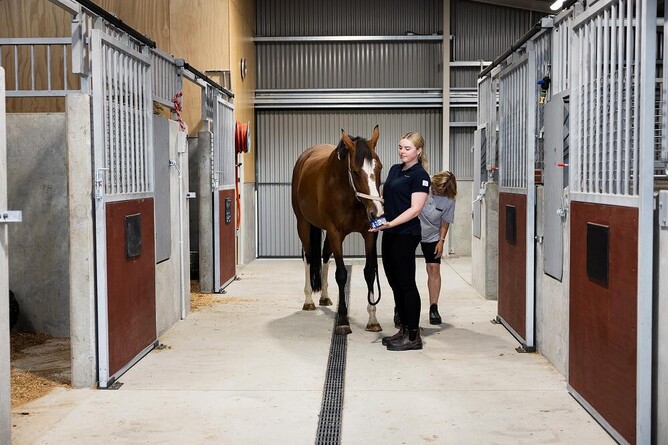Focusing on teeth, parasites, vaccinations and nutrition will help to keep your horse at its best.
Dentistry
Teeth care is essential for horses to optimise chewing of their food.
We recommend an oral examination at least once a year, unless you are advised to do this more regularly after your first visit.
Horses’ teeth continually erupt throughout their life and due to chewing in a figure eight motion, as well as the greater quantities of concentrated feed horses consume these days, they can develop sharp points which can cause discomfort during riding.
This can also lead to an unbalanced mouth which may predispose them to diastemata (spaces between teeth) and periodontal pocketing (holes in the gum next to, or around, teeth). These conditions can cause severe pain in extreme cases.
Regular dentistry by your vet will help to prevent issues from arising and also pick up on any already present or developing problems.
Parasite management
Drench resistance in horses is becoming a massive worldwide problem. This is when the parasites are no longer susceptible to the drenches we are giving.
The consequence of this is that we will see a lot more parasite-related diseases in our horses, such as colic and diarrhoea.
To help combat this, horses should have a faecal egg count done on a poo sample every 3 months and then be drenched according to the results, as advised by your vet.
A faecal sample can be dropped off to the clinic for assessment.
Vaccinations
The recommended vaccination for horses is Tetanus toxoid. Tetanus is a serious disease that is often fatal if acquired.
The bacteria lives in the dirt and can get into breaks in the skin causing tetanus.
The vaccine is 100% effective if given correctly. It requires two vaccinations (4 weeks apart), a booster at 12 months, and then a booster every 2 years after that.
The Strangles vaccine is also commonly given to horses and is strongly recommended if they are travelling out of Southland regularly for competitions, as it passes from horse to horse.
Streptococcus equi causes the disease and clinical signs are fever, nasal discharge and swollen lymph nodes. The Strangles vaccine is not 100% effective and requires 3 shots, 2 weeks apart and an annual booster.
Nutrition
Horse nutrition is becoming a niche in itself.
Requirements for each individual horse are dependent on how much work they do, weight management and age-related factors.
There are many products on the market, so please talk to your KeyVet about what is best for your horse.

